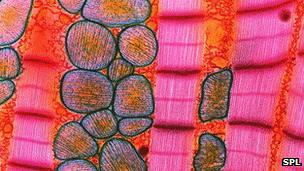Skin cells turned into healthy heart muscle cells
- Published

Scientist say they have managed to turn patients' own skin cells into healthy heart muscle in the lab.
Ultimately they hope this stem cell therapy could be used to treat heart failure patients.
As the transplanted cells are from the individual patient this could avoid the problem of tissue rejection, they told the European Heart Journal.
Early tests in animals proved promising but the experimental treatment is still years from being used in people.
Experts have increasingly been using stem cells to treat a variety of heart problems and other conditions like diabetes, Parkinsons disease or Alzheimer's.
Stem cells are important because they have the ability to become different cell types, and scientists are working on developing ways to get them to repair or regenerate damaged organs or tissues.
'New and exciting'
More than 750,000 people in the UK have heart failure.
It means the heart is not pumping blood around the body as well as it used to.
Researchers are looking at ways of fixing the damaged heart muscle.
In the latest study, the team from Rambam Medical Center in Haifa, Israel, took skin cells from two men with heart failure and mixed the cells up with a cocktail of genes and chemicals in the lab to create the stem cell treatment.
The cells that they created were identical to healthy heart muscle cells. When these beating cells were transplanted into a rat, they started to make connections with the surrounding heart tissue.
Lead researcher Professor Lior Gepstein, said: "What is new and exciting about our research is that we have shown that it's possible to take skin cells from an elderly patient with advanced heart failure and end up with his own beating cells in a laboratory dish that are healthy and young - the equivalent to the stage of his heart cells when just born."
The researchers say more work is needed before they can begin trials in humans.
Dr Mike Knapton of the British Heart Foundation, said: "This is a very promising area of study.
"However, we still have a way to go before these findings could be applied to the clinic."
- Published14 February 2012
- Published8 June 2011